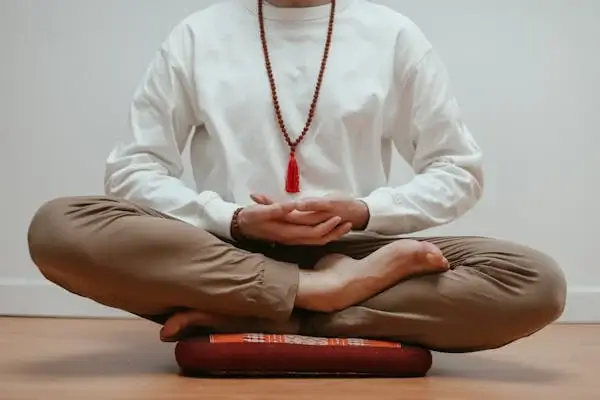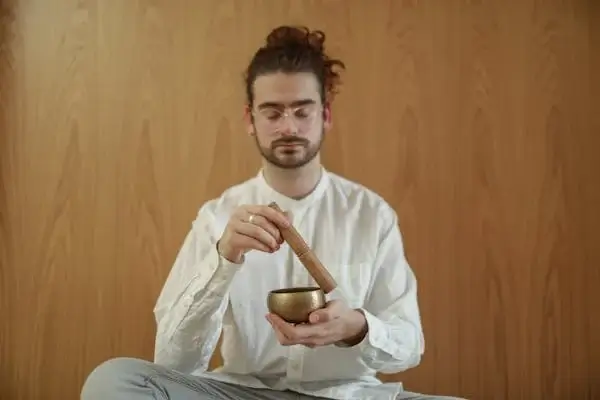
Table of Contents
Introduction
In the fast-paced world, relaxation of the mind is more essential than ever. Work pressure, family, and social obligations put our minds in different states of stress and anxiety.
Could there ever be a way to calm the mental turbulence and unlock a state of profound relaxation and clarity? Yoga for mind relaxation offers just that. Getting yoga into your active life will see great development in the personal and professional growth that you will undergo.
This blog will detail how yoga can be used as a strong tool in relation to mind relaxation, and in a very specific detailing of the techniques, benefits, and practices required to have a calmed and focused mind.
Understanding Mind Relaxation
yoga for mind relaxation is a state or a condition in which the mind remains free of stress, anxiety, and other undesirable thoughts. It is a state of the mind that brings relaxation and clarity
. One feels at peace not only with oneself but with the whole environment. Attaining mental relaxation is crucial for general health, as the mind and body will operate freely.
yoga for mind relaxation- A relaxed mind will help you think clearly, make the best decisions, and respond effectively to every challenge in life. In both personal and professional lives, a relaxed mind improves creativity, problem-solving ability, and emotional intelligence for a more effective and fulfilling life.
How Yoga Promotes Mind Relaxation
Yoga is a holistic approach that incorporates asanas, pranayama, and dhyana for general well-being. Here is how yoga specifically helps in attaining relaxation of the mind:
Relaxation Techniques: This includes a relaxation technique that helps in the relaxation of the mind, Yoga Nidra, or Yogic Sleep, as it is popularly known.
This is a guided style of meditation that helps one to reach a deep state of conscious relaxation where the brain can rest and rejuvenate. yoga for mind relaxation is this will not only help calm the mind but also release deep-set tension and stress from the body.
Stress Management: Really, the management of stress could take a boost through yoga because it is all about both physical and mental practice.
yoga for mind relaxation help in the physical postures, or asanas, will help release body tension, while meditation and mindfulness practices calm the mind, yoga for mind relaxation generally reducing stress levels.
The major stress hormone, cortisol levels in the body, could also be reduced by regular practice of yoga for general ease and relaxation.
Breathing Exercises: Pranayama, yogic breathing exercises, tends to control the breath to aid in nervous system balancing and psychological stress reduction is done with yoga for mind relaxation
Of the various techniques taught, alternate nostril breathing, or Nadi Shodhana , and its variation deep abdominal breathing, otherwise called Diaphragmatic Breathing, appear to be the most effective in mental relaxation.
The mysterious flow of oxygen into the brain is achieved upon practicing the two, clearing the mind, improving concentration, and focus.


Effective Yoga Poses to Relax the Mind
There are some yoga postures that provide an excellent opportunity for mind relaxation. Some of the best include the following:
Balasana—Child’s Pose: Gently stretches the lower back and allows you to settle down into a deep relaxations, calms the mind and alleviates stress and fatigue.
. Kneel on the floor, sit back on your heels, then fold forward, reaching your arms out in front of you. Let your forehead down to the mat and breathe deeply into the belly, clearing your mind of all thoughts and focusing on the breath as the body completely releases into the asana.
Corpse Pose (Savasana): Traditionally done at the end of yoga practice, this pose is important for totally relaxing the body. It sorts out the benefits of your practice and lets your mind go into deep rest.
Instructions: Lie down with your back on the floor and your arms by the side of your body, your palms facing upwards. Close your eyes, breathe deeply, and take slow, complete repose of the body and mind.
yoga for mind relaxation and pose – It resets the nervous system and maintains one’s sense of calm.
Viparita Karani- Normally indicated to relieve anxiety and stress by improving blood circulation to the brain and, at the same time, soothing the nerves.
Instruction: Sit beside a wall and lie down on your back, and stretch your legs up on the wall. Both hands fall to the sides with the palms facing upwards. Inhale naturally: let the whole body calm down and relax, and the mind relax.
This asana stretches and relieves tired legs while soothing the mind, hence this is a very good practice for the relaxation of the mind.
Seated Forward Fold Pose- Paschimottanasana: The pose stretches the spine, hamstrings, promotes relaxation, and decreases stress.
Instructions: Sit with your legs stretched in front of you. Inhale to lengthen the spine; then, exhale, and bend down, trying to reach your feet.
Hold on to the position and breathe gently. This forward bend helps to take out the tension from the back and hamstring muscles and results in mind relaxation.
Mental Clarity: Yoga brings you mental clarity by de-cluttering your mind, intuition, and ability to think well. That, in itself, may determine good decision-making.
yoga for mind relaxation- Combined body movements with mindfulness improve the sharpness of the mind and facilitate cognitive functions.
Regular yoga practice improves better memory, concentration, and sharpness of the mind, which makes it easy to move around challenges and tasks during the day.
Emotional balance: yoga for mind relaxation With regular practice, yoga induces emotional balance with a reduction in anxiety, depression, and irritability.
Yoga brings relaxation and freedom from stress, which in turn stabilizes moods and makes emotional well-being secure. The mindfulness part of yoga encourages self-awareness and self-acceptance, which almost corresponds to emotional resilience and stability.
Stress Reduction: Reduction in stress is one common benefit associated with yoga. It reduces cortisol-the major stress hormone, through physical postures, breathing exercises, and meditation.
It reduces the level of chronic stress, which is of great concern, along with associated health risks such as heart disease, hypertension, and anxiety disorders.
Overall Mental Health: Yoga supports overall mental health by improving resilience, enhancing sleep, and increasing self-awareness.
The practice enunciates a positive mind and aids in building both mental strength and flexibility.
By promoting the release of neurotransmitters such as serotonin and dopamine, associated with happiness and well-being, yoga helps in developing a general feeling of mental health and emotional balance.
Integrating Yoga into Everyday Life for Personal and Professional Success
To achieve the full benefits of yoga in the relaxation of the mind, it is important to do the following as part of your daily routine. Here are some tips:
Daily Schedule: yoga for mind relaxation Start your day by taking a very short session of about 10-15 minutes. This brief practice can change the quality of the mind immediately. This can have yoga asanas, breathing work, and a short meditation to start your day with focus and clarity.
Professional Benefits: yoga for mind relaxation A calm, focused mind could render subsequent professional performance better due to increased concentration, creativity, and decision-making abilities.
Take short yoga breaks here and there to beat away stress and keep a clear mind. Practicing yoga in the workplace increases productivity, reduces burnout, and enables a more friendly working atmosphere.
Self-Development: Regular yoga practice aligns one with self-evolution by being self-aware, emotionally balanced, and thinking positively.
Use yoga as an approach toward development to be empowered with a better you. Regular practice empowers self-reflection and mindfulness, so that deeper meaning with reference to one’s self and the objectives in life is elicited.
INTEGRATING YOGA WITH OTHER RELAXATION TECHNIQUES
As much as yoga for mind relaxation is a great tool for relaxing the mind when practiced, here are added relaxation practices you can add to this:
Practice Mindfulness Meditation: yoga for mind relaxation
While doing yoga, practice being mindful in meditation to calm the mind further and concentrate more. Mindfulness is generally bringing one’s complete focus to the present moment in a judgment-free manner.
This tends to make the mind quiet and reduces stress.yoga for mind relaxation Do mindfulness meditation while you go about doing your yoga and nurture a state of awareness in the present moment.
Guided Meditation: Utilize yoga as an additional guided meditation recording practice. Guided meditations can help you get deep relaxation as well as mental calm and clarity.
Use guided meditation recordings cantered around relaxation, stress relief, and clarity of mind for an enhanced yoga practice.
Holistic Approach: If you make yoga part of other relaxation techniques along with deep and progressive muscle relaxations and visualizations in your overall mental wellness program, yoga for mind relaxation should be able to easily come out with well-balanced and relaxed states of mind.
Go ahead and make a full-blown relaxation plan supplementing your yoga regimen that both in combination should be able to do justice to overall mental health and well-being.


Conclusion
Yoga is the potent practice that can change the very face of your personal and professional life. These are the relaxation techniques, stress management techniques, and easy yoga postures which enlighten the human mind, balance out emotions, and mental health in this cut-throat competitive world.
This practice of yoga for mind relaxation, in combination with other relaxing exercises, multiplies its benefits through which you can achieve a peaceful and focused mind. Start the journey towards mind relaxation and personal and professional success today by integrating yoga into your life.
